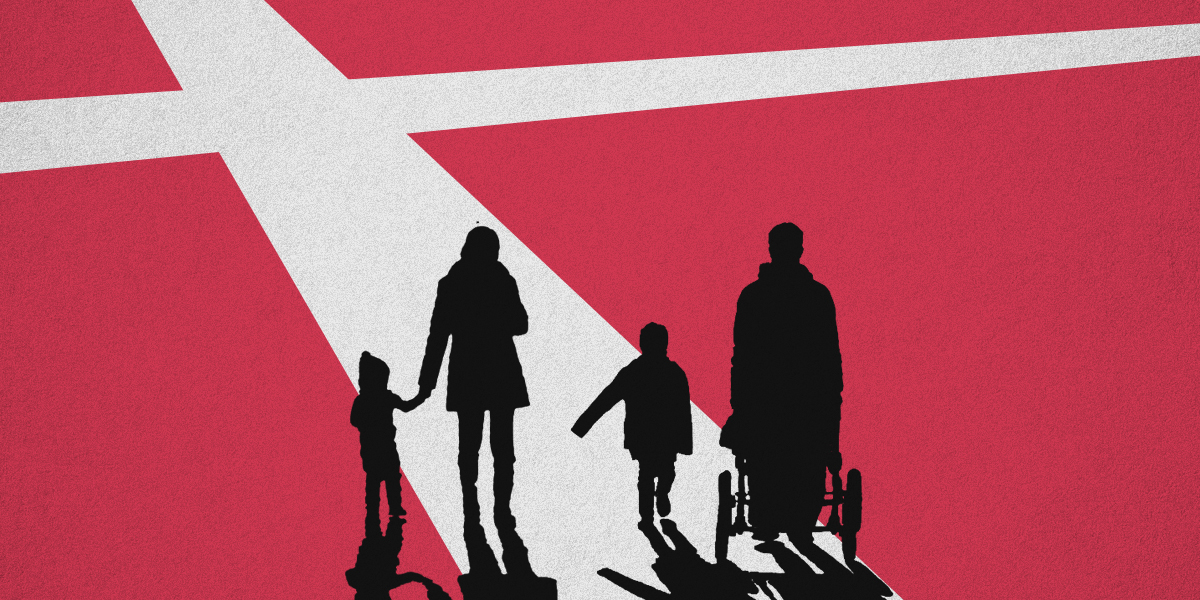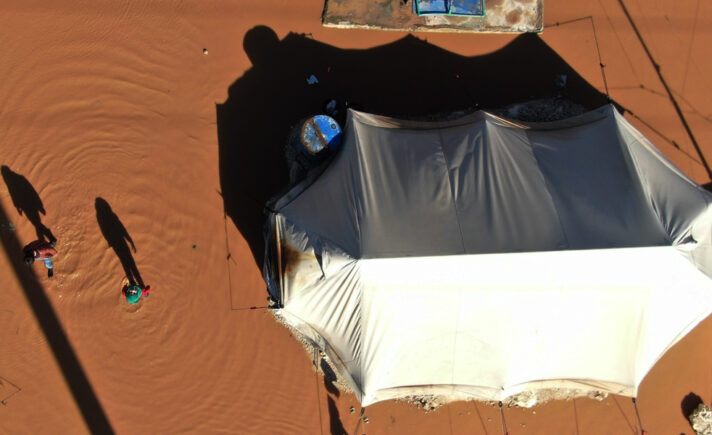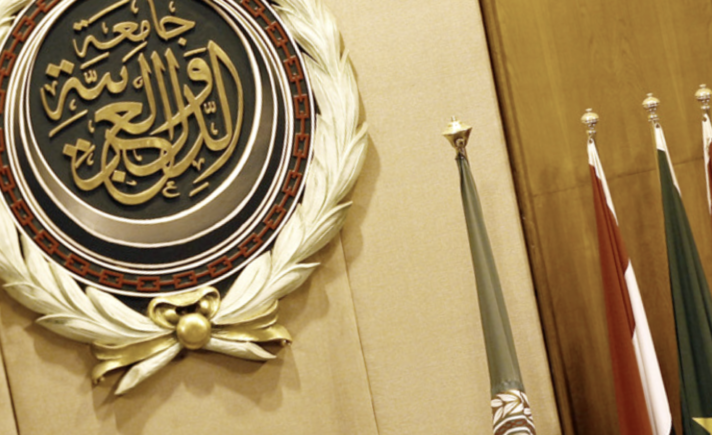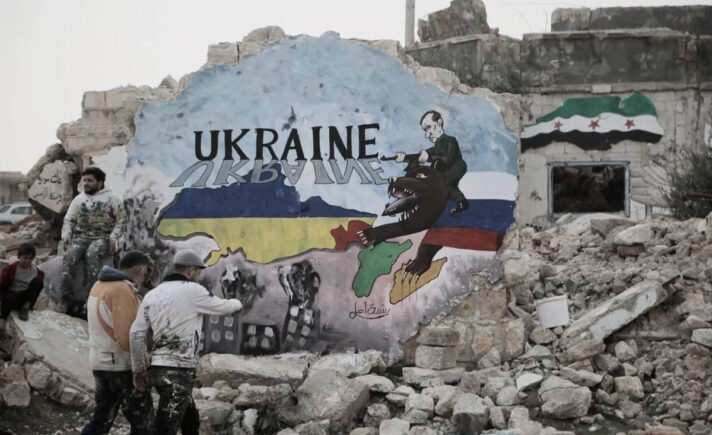[Editor’s note: This article was published on Al-Jumhuriya Arabic on 6 July. It is also available in Arabic.]
A Danish court issued a ruling to deport me to Syria by April 4th of 2021. This ruling followed three court sessions: the first resulted in the refusal to renew my Danish residency; during the second it was ruled that I would be deported to Syria; and during the third my appeal to the court was rejected. All of the judges’ rulings were based on the fact that I am a woman from the city of Sahnaya; I sought refuge in Denmark on the grounds of instability in Syria, but today my town is safe in the eyes of the court, which determined that I could return there to live and work without any threat to my life.
After the third ruling, I tried to obtain a work permit through my job, but my application was rejected on the grounds that the number of hours included in the employment contract was insufficient as per the laws governing work permits in Denmark. Therefore, by November of last year, I had exhausted all available legal avenues for avoiding this nightmare; returning to the country from which I fled after my husband was murdered. I had about five months to think about what to do: allow the Danish police to take me to a deportation camp (waiting for a change in the state of diplomatic relations between Syria and Denmark to allow me to be repatriated); sign a statement of “voluntary return” to Syria via Lebanon; or flee to another European country that might be more sympathetic to my situation. All of these choices were difficult, but on the last day of my lawful stay at home I decided, based on advice from acquaintances and friends, to take a bus to the Netherlands. I brought with me all of the papers explaining how Denmark wanted to send me to my possible demise. The journey felt longer and more harrowing than it was, and one scenario kept flashing in my mind: Danish police boarding the bus and taking me to the deportation camp.
When I arrived in the Netherlands late in the evening on April 4th, I did not know where I would go or sleep that night. I stood there crying in the street, exclaiming “Ya Rab (Oh, God)” through my sobs. Meanwhile, a Dutch lady who was watching me from her window came downstairs to talk to me. I told her my story, and she brought me into her house briefly while she prepared herself to take me to a nearby refugee camp. I slept my first night in that camp, and in the morning they gave me a preliminary interview. The people in charge there told me they would hire a lawyer to represent me and gave me a temporary residence document valid for one year. They also said that if I had come here before I had exhausted all possible means of staying in Denmark, I would not have been accepted. My life today is tied to the validity of this temporary residence document, and I do not know what will happen to me when it expires.
- Amira, a Syrian residing temporarily in the Netherlands after Denmark decided to deport her to “safe” Syria
* * * * *
During Spring of this year, Denmark caught the attention of human rights organizations and all those interested in immigration and asylum issues around the world. In early June, legislation was passed in the Danish Parliament that made it possible for the country to make agreements with countries outside the European Union to deport people seeking asylum in Denmark while their cases are being considered. The legislation also created the possibility that these asylum seekers would remain in the country to which they had been deported even if their request for asylum in Denmark was granted. Following the passing of this legislation there was a barrage of criticism from political and human rights groups both in Denmark and at the levels of the European Union and the larger international scene. This backlash emerged amid reports of steps being taken to conclude the first agreement of this kind with Rwanda.
As asylum seekers were being trapped, and more than one month before a decision was made to assign asylum seekers to subcontractors in exchange for material aid, Danish authorities also issued a decision that was hostile to Syrian refugees. Denmark became the first European country to consider Damascus and its countryside to have become safe areas, thus enabling the country to void the residency permits of more than two hundred Syrian men and women who had been granted the status of humanitarian refugees, and then to issue deportation orders against them. Since direct diplomatic relations between Denmark and the Assad regime continue to be severed, these deportation orders do not yet apply. They do, however, suspend the lives of Syrian refugees with residency status, depriving them of all rights to work, study, or hold a living arrangement, and placing them in “limbo;” detention centers for people waiting to be deported where, according to human rights reports, the conditions are “worse than prisons.” The Council of Europe has also previously expressed its “shock” at the poor conditions at these centers). Those who are taken to these detention centers stay there until they manage to find themselves a third destination. Others, who find themselves desperate in the face of these changes in Danish law, and who believe that they may not be wanted by Syrian security forces, opt to cancel their asylum claims themselves and request “voluntary return” to their country of origin; currently this is the only legal way for Denmark to deport people to Syria.
This decision, in turn, sparked a great deal of criticism from political and human rights groups. This criticism did not limit itself to examining the bad intentions behind this decision or the lack of ethical, political, and humanitarian considerations, but also pointed to the way in which it was approved. The decision was based mainly on a Country of Origin Report issued by the Danish Immigration Service directorate within the Danish Ministry of Refugees, Immigration, and Integration Affairs. The report was issued on the situation in Damascus and the question of return to Syria after the regime reoccupied Eastern Ghouta and consolidated its control of the areas of Damascus and its countryside that had previously been lost to regime control. It was based on a series of interviews with researchers, human rights activists, and humanitarian and relief organizations that either work inside Syria or closely follow its situation, as well as a Syrian lawyer residing in Damascus, and a “general in the Syrian Ministry of Interior.” Following the passing of the decision to cancel the residency permits of hundreds of Syrian refugees in mid-April of this year, the vast majority of those who were interviewed for this report issued a joint statement. In it, they express their strong dissatisfaction with the way in which their answers to questions about the security situation and the cessation of military operations after the regime regained complete control over the region were twisted and misinterpreted. The report seemed to aim to solidify the claim of stability in that region, and make it possible to return refugees to these areas.
Sarah al-Kayyali, who researches Syria within the Middle East and North Africa division of Human Rights Watch, was one of the people interviewed for the Danish Syria report, and a co-signer of the joint statement issued alongside her colleagues whose experiences also informed the report. In an interview with Al-Jumhuriya, Sarah said, “the interviews conducted with me and the others whose opinions were surveyed were taken out of context. The conclusions made by the report are completely contrary to ours. The questions listed in the report are also different from what we were asked. The answers were ours, but the questions were not the same as what was published in the report.” She went on to add:
We were asked many detailed questions related to the security situation, the number of checkpoints, the number of return cases that we knew of, and the sums of money that returnees must pay, all according to our knowledge. These were included in the report under the category of ‘potential difficulties and risks faced upon return.’ We presented detailed discussions of arbitrary arrest, torture, and other concerns. These were not included in the report, but only mentioned in the appendices. Meanwhile, the question of our assessment of the safety of return to Damascus and its countryside – that is, the main conclusion that the report was used to enshrine in Denmark – was not asked at all.
As for her impression of whether or not this report was genuinely trying to find out the reality of the situation in the Damascus area, Al-Kayyali said the following:
My perception of what happened is that the Immigration Service, with the Danish government behind it, had ready-made conclusions and worked to produce a report that supported those , and in this context the interviews with us were used for this purpose. Our names as individuals and entities were used to support the credibility of a false claim. The vast majority of those interviewed stated that they rejected the report. How can such a false report be used to formulate policy?
The “general in the Syrian Interior” who helped inform the report is none other than Major General Naji al-Numeir, Director of the Immigration and Passports Department in the Syrian Ministry of Interior. He is infamous among Syrians for a radio interview with Ninar FM in which he attempted to justify the imposition of a hundred dollar fee on Syrian arrivals, to be exchanged at the Central Bank’s exchange rate. At the time, he delivered a message to those who were stuck at the Lebanese border due to their inability to pay this amount, and to the Lebanese authorities who in turn refused to allow them re-entrance into Lebanon. His advice was so ridiculous that it prompted mockery even from outlets that are biased to the regime, such as RT.
At the time of this article’s publication, Major General Naji al-Numeir had not publicly objected to the Danish report.
* * * * *
I left Syria for Egypt at the age of nine, accompanied by my parents, my sister and my brother. After staying there for three years, my father decided to take the sea to Denmark with my brother, still a minor at the time. We hoped that the whole family would be reunited when their papers were completed in the new country. They managed to reach Denmark in 2014 after a harrowing journey, but all their attempts with the Danish authorities to bring us over failed. The only option we were left with was the same one that my father and brother took. We finally made it there, but only after a journey no less difficult and dangerous than what the first half of the family had endured on their way from Egypt to Denmark. Our family was reunited in 2015, and in 2016 we received temporary protection cards valid for two years.
Until 2019, our legal status in Denmark was fine, but I was experiencing the daily hell of racism in the way I was being treated by classmates. The reason for this racism was that I am Arab and I am a veiled woman. I often went out to play and came back to find my shoes in the school toilet, and they often threw water at me. One time they hid my mobile phone at the school for a week. I tried to complain repeatedly, but nothing changed. Then I tried to confront my bullies and mirror their behavior, but that didn’t work either. I hated those heavy hours in school, and I moved between several schools in the hope of finding a better atmosphere. I missed months of schoolwork as a result of the psychological strain I was put under during that period. Since September of last year, when I reached the ninth grade, the municipality of the area where I live decided that I could no longer go to school there because, without giving a reason, Danish authorities refused to renew my residency permit, heedless of the fact that I have been without a residency permit for more than two years.
- Hiba, a young Syrian woman threatened with deportation from Denmark
* * * * *
In recent decades, Denmark has been at the forefront of a trend in the Western World of placing immigration and “integration” issues at the center of domestic political debate. The immigrants in question are hail from poorer countries and continents, and they are brown, black, Muslim, or a combination therein. This discourse goes beyond racial, religious, and cultural elements of identity, and even surpasses the question of whether immigrants can “integrate” into Danish society. The debate extends to the fact that the majority of the immigrants in question are poor, that they will work in lower-paying professions, and that they and their families will continue to receive social benefits even if they work and pay taxes. Ditte Ingemann Hansen, consultant on policy against inequality and discrimination at the Danish chapter of ActionAid International, explained in her interview with Al-Jumhuriya that the antagonism towards poor immigrants and refugees is based on a kind of protectionist welfare-state patriotism:
The welfare state is part of Denmark’s identity, and a source of national pride. A robust economy and mechanisms of social solidarity ensure a distribution of social benefits in which Danish politicians pride themselves, and which they travel the world to speak about. The discourse against the emigration of the poor as a threat to the social welfare system is not new. It began circulating on the right years ago, before being adopted by European democratic socialists in their political race against the right, and then by liberals after this electoral logic proved effective.
In this context, one could cite many news developments from the last decade, such as the harsh and discriminatory 2012 legislation which ensured that the number of “non-Western” residents in social housing neighborhoods would not exceed 30%; a project to isolate immigrants on a remote island if they have committed crimes and cannot be returned to their country of origin; or instances of Danish officials comfortably expressing their anti-immigrant policies and attitudes. One example of the latter can be found in the uproar that was caused when the former Minister of Immigration and Integration, Inger Støjberg, posted a photo to Facebook in which she displays a cake bearing the number 50. The cake was in celebration of Amendment No. 5, which introduced strict measures to immigration laws during her tenure as minister of immigration. Despite the controversy, Støjberg served in the position for two more years, completing her four-year term.
Concerning the position of refugees in this discourse, Ingemann Hansen explains: Amid this discourse against poor immigrants as factors of net loss in the balance of what they contribute against what they receive from the social welfare system, refugees are presented as a pure loss, since it is said that the state must spend massive amounts of money on them over a long period time, and that a large proportion of them will be unable to enter the labor market competently.
An expert on Danish foreign policy who preferred to remain anonymous says that, “in large circles within Danish politics, asylum is viewed as a legal loophole that allows new immigrants to enter Denmark.” The expert goes on to add:
In this prevailing logic, Denmark’s humanitarian responsibility lies in being generous in its financial support to neighboring countries that suffer from wars and disasters, or in supporting the stability of these countries after the fact, not in letting refugees come and settle here. This is considered exploiting a system’s loopholes. Let us support these people in their country, or in the countries that neighbor theirs, but it should not be attractive for them to come here, as that is dangerous for Denmark and supports networks of smuggling and human trafficking. We want to help them, but not at the expense of our country. This is what voters are told.
This debate saw an intense surge in 2015. One good example of how entrenched this logic had become is the harsh statements made in late 2015 by the Danish Prime Minister at the time, Lars Løkke Rasmussen, about the need to reconsider the Geneva Conventions on the status of refugees – regardless of the fact that Denmark was the first country to sign this convention in 1951. Speaking about the year 2015, Ingemann Hansen says that:
With the largest wave of refugees, and pictures of people walking on the roads and railways in Europe, the year 2015 represented a turning point in the polarization of this political debate. On one side there are those who adhere to humanitarian responsibility and the need to help refugees. On the other are those who capitalize on scenes depicting large numbers of people in order to say that this is too much and that this many refugees cannot be absorbed and integrated, and that Denmark must be protected and an end must be put to the policy of accepting refugees.
The upsurge of anti-refugee sentiment after 2015 has included developments such as policy proposals to confiscate refugees’ funds and jewelry in excess of a certain minimum, which would be used to finance their accommodations (2016). The sitting Social Democrat Prime Minister, Mette Frederiksen, has also made rather blunt statements that her government’s goal is to bring the number of asylum applications to “zero” by the beginning of this year. Then there are the measures that have been taken in the last two months, as discussed above. However, a joint paper by Nikolas Feith Tan, senior researcher at the Danish Institute for Human Rights, and Jens Vedsted-Hansen, a professor specializing in human rights and migration at Aarhus University, suggests that the “paradigm shift” was written into 2015 amendments to Danish asylum law, and into the third clause that was inserted into its seventh article (known as 7.3 among refugees in Denmark). Ditte Ingemann Hansen agrees with the researchers’ point about this profound transformation, and explains that:
The amendment introduced in 2015 constituted a paradigm shift in asylum, from stability and integration towards a type of temporary protection, with a large emphasis on its temporary nature. It is renewed every year, and seems specifically tailored to the waves of Syrian refugees. Beyond that, the amendment added weight to immigration services’ assessment of the conditions of the country of origin, at the expense of the specifics of a given asylum seeker’s personal case. It is important to see how this amendment introduced shifts in the language of legislation that led to a situation in which ending humanitarian protection is no longer tied to reaching stability and security in the country of origin. Rather, it introduced the possibility that protection status could end based on any qualitative change in the country’s conditions, regardless of general stability and security, as was the case in the past… With time, I have become convinced that they legislated in this way because at the time they were waiting for Bashar al-Assad to be toppled, or for him to step down or enter into a serious political process. Whatever the case, they could use it as a ‘qualitative change’ in the situation in order to quickly return Syrian refugees.
In Ingemann Hansen’s opinion, the most recent decision is the expected result of the legal amendments made in 2015. The cessation of military operations in Damascus and its countryside after the areas were re-occupied is a “qualitative change” in the situation, regardless of the safety and stability of these conditions. This change is what led to the report we discussed above, around which policies have been formed. In Ingemann Hansen’s words:
These measures are sometimes justified by exploiting violations to the conditions of asylum made by some Syrian refugees, as well as clandestine visits to their country of origin. It is as if the violations of some justify collective punishment against all. However, the main argument is that as long as forced repatriation to Syria is not yet possible, some refugees accept voluntary return after being pushed into the deportation-camp limbo. The goal here is twofold: to get rid of those who are here by suffocating them into accepting voluntary return, and to send a loud and clear message, ‘Don’t think about coming to Denmark.’
* * * * *
We have been without valid residency documents for more than two years, and, despite our repeated inquiries, we have not received answers from Danish authorities regarding reasons for the delay. The Danish government waited until my daughter Hiba turned 18 to summon us for a new interview. The purpose of the delay in renewing our papers was that my husband and I would not have a minor child in our file. In March 2021, we received a letter informing us that we could not renew our residency in Denmark, and then a judge ruled that we ought to be deported to Syria. The decision did not include all family members; they considered that my male son is threatened with conscription in the event of his return, and that my eldest daughter lives with a young child after separating from her husband, so it is not possible to deport her. As for me, my sick husband, and Hiba, they have no qualms about deporting us.
The judge based the deportation ruling on what she saw as a conflict between my statements and those of my husband. I said in our first interview in Denmark that three of my husband’s nephews had been killed by the Assad regime, while a fourth had been missing since 2013, and none of us know anything about his fate. As for my husband, he said all four were killed. I discussed this detail with him a lot afterwards, and why he said that his disappeared nephew had died. My husband said that if he were alive, we would have known something about him over the past years. Perhaps the judge does not know anything about the tens of thousands of cases of forcibly disappeared persons in Syria! The judge also said that we used to live in Yarmouk camp in Damascus, which today is safe, and that for people of our age, returning to Syria does not involve any risk! As for Hiba, nothing is clear about the reason for her deportation except that she is our daughter. Today, we are awaiting the date of the court appeal, and I hope that we will not face the terrifying situation that other Syrians have found themselves in when the court made the final decision to deport them to Syria.
But in the midst of all of this, we are afraid of the successive decisions being made in this country by people who insist on preventing us from living a stable life. Our hearts are filled with fear at each sunrise. I ask you not to mention my legal name, because I fear consequences in this country that I came to in order to escape the Syrian state of silence and fear. We are not well here. Hiba lived through the hardest days of her life as a result of the racism she experienced in this country, and today we live in hardship until our fate is finally decided. We know very well that we live in an environment that does not want us, not today or any day. Even if we stay here, we will never feel safe or stable. We know this well from the experience of the past years in this country.”
- Hiba’s mother
* * * * *
In the opinion of the expert source on Danish foreign policy who preferred to remain anonymous:
The current trend is very bad at the level of policy making. First, this is because policies are being based on false facts presented in the form of deceptive reports; secondly, because they are faulty on humanitarian and moral levels, and thirdly, because they put Denmark in a very bad position at the level of foreign policy, and make the country look bad in front of its allies and political and economic partners… The worst thing, however, and I am talking here about Syria in particular, is that Denmark is nefariously contributing to making the deportation of Syrians to Syria and opening up relations with Bashar al-Assad (even if they haven’t done this yet) into issues that are up for discussion, and in a banal manner.
When asked if we can anticipate a unilateral Danish opening of diplomatic relations with the Assad regime in order to facilitate the forced repatriation of refugees, the source answered:
I do not think that Denmark is willing to act unilaterally on this, as this would put the country in a direct confrontation with its closest allies, and Denmark is already quarrelling with them regarding its policies on Syria. Denmark will not initiate alone, but there is no doubt that it is monitoring the situation and preparing to be next after the first group of countries normalizes relations, and this is not limited to the European family such as Hungary, the Czech Republic, etc. We know that moves by the United Arab Emirates last year sparked interest in monitoring the reaction of the United States. When it came, the American response took the form of a reminder of the consequences of opening economic relations with the regime at the time, and it was clearly understood.
Ditte Ingemann Hansen agrees that Denmark’s domestically informed Syria policies are related to concerns about asylum, and that what is stopping their escalation is mainly external elements. She adds, “Our work against these policies does not only seek to capitalize on the positions of allied countries, especially the United States, but we are also trying to coordinate with them and put more pressure on Denmark.”
Is there a political path within Denmark other than pure human rights advocacy and soliciting international pressure? Ingemann Hansen does not hide her despair at the possibility of change in the convictions of the ruling Social Democrat party leadership; “They are very convinced that this policy is effective, that it can address the concerns of a large part of Danish public opinion, and that it is electorally profitable.” She stresses that there are political options available at the local level, however, especially in the context of political activity at the municipal level, and even within the ruling party itself. She says that:
The upcoming municipal elections will be a great opportunity to deepen the debate on this issue, and to capitalize on the concerns that many voting blocs have about the trend in Denmark regarding asylum policies and their impact. We are coordinating efforts in order to create robust campaigns and coordination and networking efforts between human rights and political circles that do not want Denmark to be this way.







